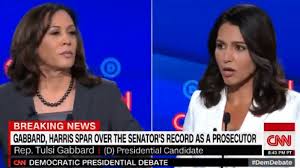
Tulsi Gabbard Appeals to Amerikan Thinking on Injustice System

At the latest Democratic Party debate among candidates for U.$. President, Tulsi Gabbard made headlines by appealing to emerging views on the criminal injustice system among younger Amerikans. Ey did so in attacks on former California District Attorney Kamala Harris. Gabbard focused on two issues of particular interest to the petty bourgeoisie: drug decriminalization and prison labor.
Senator Gabbard opened eir comments by expressing concerns for the “broken criminal justice system that is disproportionately, negatively impacting Black and Brown people all over this country.” Ey went on to say that Harris “kept people beyond their sentences to use them as cheap labor for the state of California” and condemned Harris for imprisoning people for marijuana possession and then laughing when ey was asked if ey had ever smoked it.
The prison labor point was specifically about concerns Harris’s office raised about losing firefighters if they complied with court orders to reduce the prison population.(1) The court had ruled that overcrowding in the state had led to cruel and unusual punishment. As we’ve established in our own surveys and research, most prison labor is for the state, and most of it is to maintain the prisons themselves. Fire fighters are the exception in terms of the important role their work plays in protecting humyn life, and no doubt Harris’s legal team was playing that up at a time when wildfires were a major headline in California. But the fire fighters are typical in that they are not producing value or part of the profit-making of private corporations.
Prison labor (and the privatization of prisons) has been an ongoing issue of concern for Amerikans in the age of mass incarceration. MIM(Prisons) has long demonstrated that there is a myth that exploiting prison labor is a motivating force for mass incarceration in this country.(2) It is important to point out that the petty-bourgeois obsession with this myth is largely based in class interests. On the one hand there is a fear among the labor aristocracy about competition with prison labor resulting in lower wages and higher unemployment. This has been the major political barrier that explains why prison labor for profit is so rare in the United $tates. More generally, there is a contradiction between the petty bourgeoisie and the big bourgeoisie that causes the former to be skeptical and fearful of the latter, because the petty bourgeoisie favors small-scale capitalism. This results in a general sentiment against corporations profiting off prison labor, even without the direct concern of wages. In a recent campaign ad, Gabbard condemns private prisons for profiting off prisoners.
Drug decriminalization is also very popular among the Amerikan petty bourgeoisie, in particular the movement to decriminalize marijuana. In 2016, Pew Research found 57% of Amerikans supported legalization of marijuana compared to just 12% in 1969.(3) And the younger generations were more favorable of course. In this case, public opinion is based in class interests around economics and leisure time. While there is a financial interest in the booming legal economy of marijuana products for young Amerikans, the broader public opinion is based in leisure-time interests.
The movement to legalize weed will often give lip service to condemning the blatant racism in many U.$. drug sentencing laws, similar to Gabbard’s opening statement against Harris’s criminal injustice record (above). Yet the scale of your average weed festival/rally versus that of the size of your average protest against torture (of primarily New Afrikan and Chican@ men) tells a clearer story. These reformists for persynal freedoms of the petty bourgeois individual are not going to do anything about national oppression in the form of targetted arrests, sentencing, concentration camps and torture chambers that make up the U.$. criminal injustice system.
MIM has long used the “Willie Horton”-style of campaigning as an example of Amerikans support for national oppression, especially of New Afrikans.(5) While “tough-on-crime” politics is finally waning, we have yet to see whether Amerika can really start to decrease its prison population now that the infrastructure and economic self-interest has been built up around it.(6) Beyond that, the national question is only more at the forefront today, with Amerikans chanting “send them back” at a recent rally held by current President Trump, where they were calling for female Senators who are not white to be sent back to the countries their ancestors came from.
It is important to be aware of these shifts, as they may provide opportunities for the anti-imperialist prison movement. But there has been no change in the overall orientation of the Maoist Internationalist Movement that sees nation as the principal contradiction both internationally and within the United $tates. We continue to organize with the medium-term goals of building dual power and independent institutions of the oppressed and the long-term goal of national liberation and delinking from imperialism.
Related Articles:This article referenced in:








